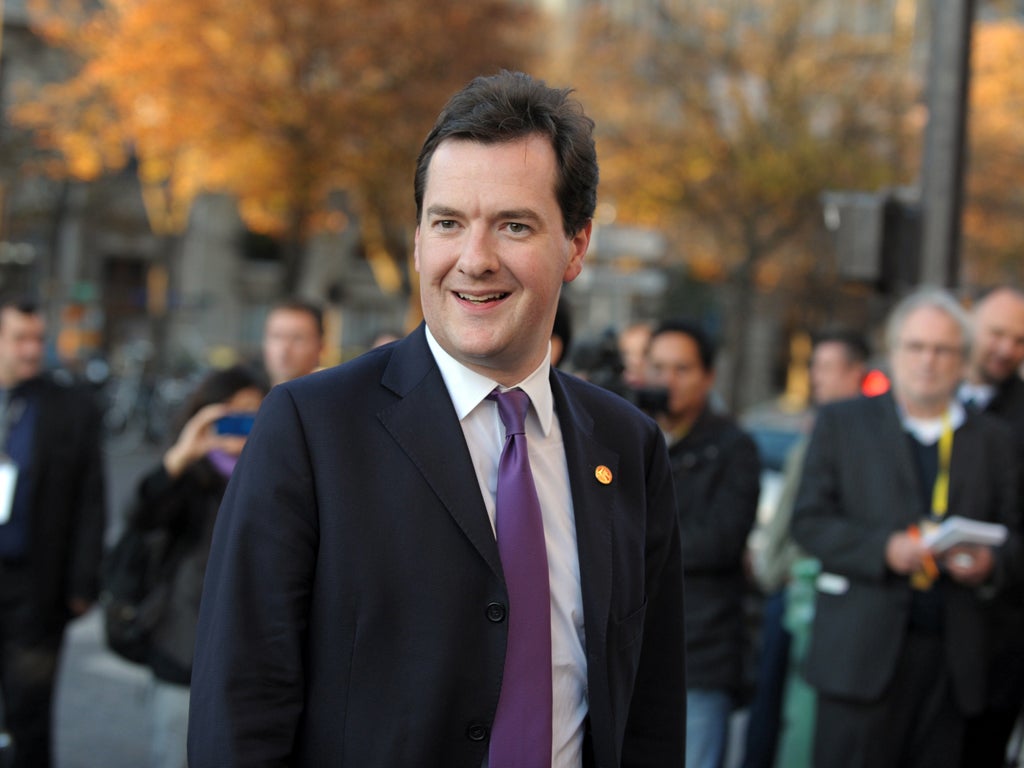Andrew Grice: Beware, George, of playing the euro blame game
Inside Westminster


Politicians have always played the blame game by diverting responsibility for bad news or unpopular decisions. But recently the Government seems to have turned it into an art form.
Theresa May, the Home Secretary, launched a pre-emptive blitz in friendly newspapers to blame the relaxation of our border controls this summer on Brodie Clark, who was suspended as the head of the UK's border force. The row over passport checks will be long forgotten by the next general election. The economy will surely be the issue. So it is no surprise that we have seen an outbreak of BSE – Blame Someone Else – on that front.
Ministers did a brilliant job of pinning the deficit on overspending by the previous Labour government, even though it was due mainly to a global financial crisis. Labour gave the Coalition a big helping hand by vacating the pitch during its four-month leadership election last year.
As doubts grow about the Government's deficit reduction strategy, ministers have got another excuse. The eurozone debt crisis provides convenient cover for the UK's flatlining economy. There's only one problem: the economy was growing (and unemployment falling) when the Coalition was formed last year.
The slowdown started a year ago, but the eurozone problems did not reach crisis levels until this summer. Labour bangs on about this, but doesn't get much of a hearing. But this week the respected Organisation for Economic Development and Development reminded us of the chronology, backing Labour's timeline. The crisis on the Continent was also cited by ministers, as they explained this week's depressing rise in youth unemployment to more than one million.
"These figures show just how much our economy is being affected by the crisis in the eurozone," said Chris Grayling, the Employment Minister. "Our European partners must take urgent action to stabilise the position."
It was a clear enough argument. But a closer look at the calendar tells a different story. The euro crisis intensified in late July and Wednesday's jobless figures covered the period July-September. But there is always a time lag before events feed through to the unemployment figures – normally between six and nine months. So the eurozone turmoil can't be responsible for this week's statistics.
On the face of it, the euro is a better fall guy than Labour. No one can doubt there is a crisis in euroland. It's easier to blame foreigners, a tune that many of our newspapers love to hear. Some haven't moved on since that wonderful headline: "Fog in Channel – Continent cut off."
Bashing Europe also wins Tory ministers brownie points and more breathing space from their backbenchers, many of whom are relishing the euro meltdown.
No one disputes that the eurozone crisis is affecting the UK economy; 40 per cent of our exports go to the 17 countries in the euro and 50 per cent to the other 26 members of the EU. What ministers don't say is that they gambled that an export-led recovery would make up for the deep public sector cuts they announced last year and secure much-needed growth. Similarly, public sector job cuts would be outnumbered by those created in the private sector.
George Osborne, pictured, will have some gloomy news to explain when he delivers his autumn statement in 10 days time. On the same day, the independent Office for Budget Responsibility is expected to revise downwards its forecasts for growth, while predicting higher unemployment and public borrowing than previously. No doubt Mr Osborne will point the finger of blame at the eurozone. It would be hard for any Chancellor to resist the temptation. But he will have to choose his words carefully. He will doubtless argue that Britain has escaped the storms which have battered Greece and Italy because the Coalition took decisive action on cutting the deficit last year and retained the confidence of the financial markets. But wise Tory MPs believe he should not claim the UK is a "safe haven," a phrase ministers have used before. That might jar with our anaemic growth figures and, potentially, contradict the campaign to blame all our ills on the eurozone. Mr Osborne wouldn't be the first politician to try to have it both ways, but it might make it harder to avoid the blame.
Although Labour's claim that the Coalition cut "too far, too fast" looks increasingly plausible, some Labour folk fear privately that blaming the eurozone will still work for Cameron-Osborne at the next election. It's the €64,000 question and we can't possibly know the answer today.
But it would be risky for the Tories to bank on it. By 2015, many voters will surely want to judge them on their own record, rather than events on the other side of the Channel.
Join our commenting forum
Join thought-provoking conversations, follow other Independent readers and see their replies
Comments
Bookmark popover
Removed from bookmarks